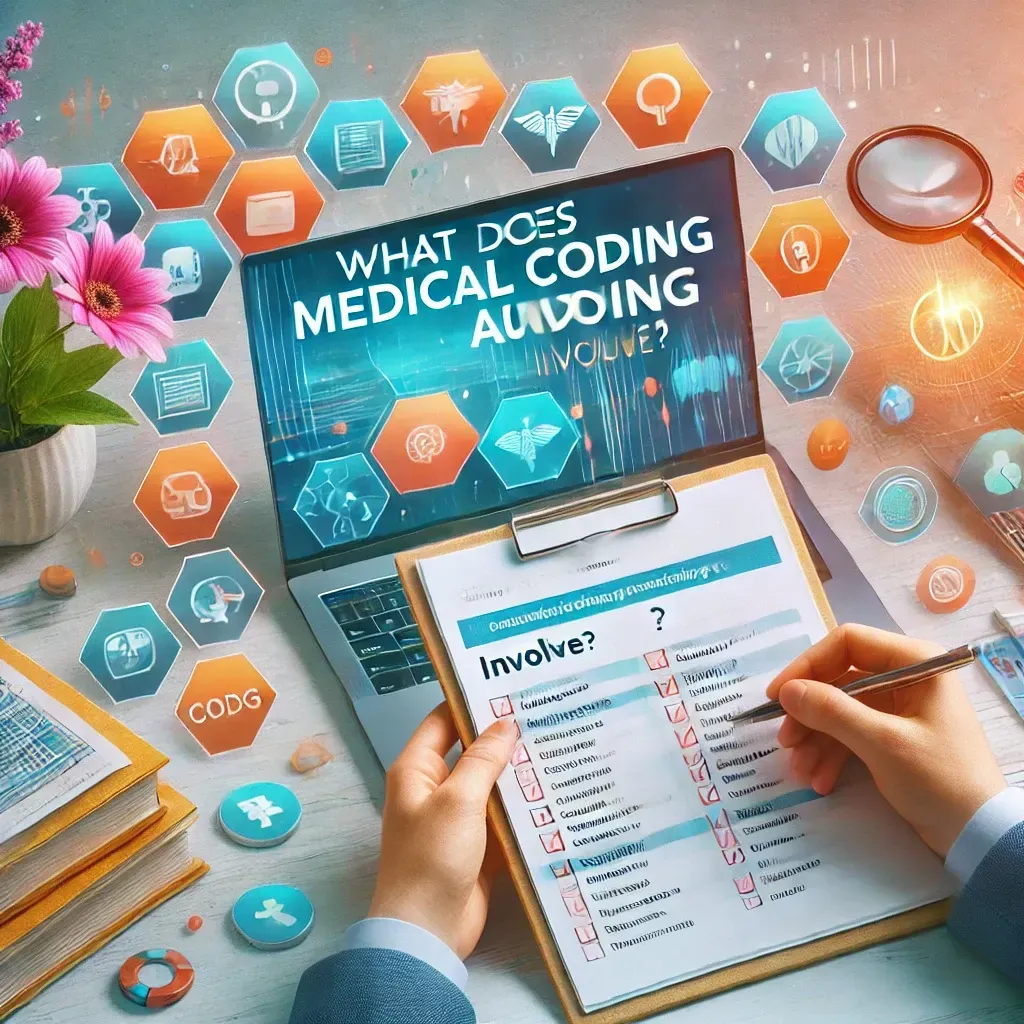

What Does Medical Coding Auditing Involve?
What Does Medical Coding Auditing Involve?
Introduction
Medical coding auditing is a systematic process that involves reviewing medical records, billing information, and coded data to ensure accuracy, compliance, and adherence to regulations. Coding audits play a crucial role in identifying errors, improving coding practices, and minimizing risks of claim denials and compliance issues. This article provides an overview of medical coding auditing, its importance, the types of audits, and best practices for effective auditing.
What is Medical Coding Auditing?
Definition of Medical Coding Auditing
Medical coding auditing is a quality control process where auditors review coded data to ensure that the codes applied accurately represent the services provided. Audits focus on verifying that coding practices comply with regulatory standards, such as CMS guidelines, and that they align with clinical documentation.
Goals of a Coding Audit
The primary goals of a coding audit are to identify errors, ensure compliance with healthcare regulations, improve billing accuracy, and support financial integrity within healthcare organizations. Regular audits also help coders stay up-to-date with coding guidelines and maintain high standards of accuracy.
Why Medical Coding Auditing is Important
Ensures Compliance with Regulations
Auditing helps ensure that coding practices align with regulatory standards, including those set by CMS, HIPAA, and the National Correct Coding Initiative (NCCI). Compliance reduces the risk of legal issues and penalties that can arise from incorrect coding.
Improves Coding Accuracy
Audits identify common coding mistakes, helping coders address recurring issues and improve their accuracy. Enhanced accuracy reduces claim denials and increases the likelihood of correct reimbursement.
Protects Against Fraud and Abuse
Coding audits help detect instances of upcoding (billing for a higher level of service than provided) and unbundling (billing separately for services that should be billed as a bundle). Identifying and correcting these issues prevents potential fraud and abuse, safeguarding the organization’s reputation and financial health.
Enhances Revenue Cycle Management
Accurate coding directly impacts reimbursement, making auditing essential for financial performance. Identifying coding errors early helps prevent revenue loss, as it allows organizations to correct inaccuracies before submitting claims.
Types of Coding Audits
Internal Audits
Internal audits are conducted by the healthcare organization’s own coding or compliance department. These audits help monitor coding accuracy, address specific issues, and provide ongoing feedback for coders to improve their practices.
External Audits
External audits are performed by third-party auditors, such as consultants or insurance companies. These audits provide an unbiased review of coding practices, offering valuable insights into areas for improvement and helping ensure compliance with payer standards.
Prospective Audits
Prospective audits are conducted before claims are submitted for reimbursement. This proactive approach allows coders to correct errors in real-time, reducing the chances of claim denials and compliance issues.
Retrospective Audits
Retrospective audits are performed after claims have been submitted and reimbursed. These audits focus on identifying patterns of coding errors, addressing compliance concerns, and implementing corrective actions to prevent future issues.
Key Elements of a Medical Coding Audit
Documentation Review
Auditors review clinical documentation to ensure that it supports the codes assigned. Accurate documentation is essential for coding compliance and helps prevent errors that could result in claim denials.
Code Validation
Code validation involves verifying that the assigned codes accurately reflect the services provided. Auditors check the codes against coding guidelines, ensuring they match the clinical documentation and adhere to coding standards.
Modifier Application
Modifiers are used to provide additional information about procedures. Auditors assess whether modifiers are applied correctly, as improper modifier use can lead to billing errors and compliance issues.
Evaluation of Billing and Reimbursement
Auditors evaluate billing data to ensure that claims are accurate and that the reimbursement aligns with the services provided. This evaluation helps identify overbilling or underbilling issues that could impact revenue.
Compliance Assessment
Compliance assessment involves reviewing coding practices to ensure they meet regulatory standards. Auditors look for adherence to CMS guidelines, HIPAA regulations, and other compliance requirements, helping organizations avoid legal risks.
Common Issues Identified During Coding Audits
Upcoding and Downcoding
Upcoding occurs when a higher-level code is assigned than the service provided, while downcoding assigns a lower-level code. Both practices can lead to compliance issues, and audits help identify and correct these inaccuracies.
Incorrect Use of Modifiers
Modifiers add complexity to coding, as they provide context for services. Improper use of modifiers can result in billing errors, making it essential for auditors to verify their correct application.
Incomplete or Inaccurate Documentation
Incomplete documentation is a common issue that leads to coding errors. Auditors ensure that clinical notes, diagnosis details, and treatment information fully support the assigned codes.
Unbundling of Services
Unbundling involves billing separately for services that should be grouped under a single code. Audits help detect and correct unbundling issues, ensuring compliance with coding standards.
Use of Outdated Codes
Using outdated ICD, CPT, or HCPCS codes can lead to claim rejections. Auditors check for the use of current codes to ensure accurate billing and minimize reimbursement delays.
Best Practices for Effective Coding Audits
Develop a Consistent Audit Plan
Creating a structured audit plan helps ensure consistency in the auditing process. A clear plan outlines the audit scope, frequency, and areas of focus, enabling organizations to systematically address coding issues.
Provide Constructive Feedback to Coders
Audits are a learning opportunity for coders. Providing constructive feedback allows coders to understand their mistakes, receive guidance on coding practices, and continuously improve their accuracy.
Use Coding Guidelines and Resources
Auditors should reference official coding resources, such as ICD-10-CM and CPT manuals, as well as guidelines from CMS and AMA. Consistent use of these resources helps ensure accuracy and compliance during the audit process.
Incorporate Both Prospective and Retrospective Audits
Combining prospective and retrospective audits provides a comprehensive view of coding accuracy. Prospective audits help catch errors before claims submission, while retrospective audits identify patterns and inform long-term improvements.
Stay Updated with Coding Changes and Regulations
The healthcare industry evolves rapidly, and coding standards change frequently. Auditors and coders should stay informed of coding updates, regulatory changes, and compliance requirements to ensure ongoing accuracy.
Benefits of Regular Coding Audits
Improved Coding Quality and Accuracy
Regular audits help identify and correct coding mistakes, improving the quality and accuracy of coding practices. This accuracy reduces the risk of errors and supports efficient billing.
Reduced Claim Denials and Faster Reimbursement
Accurate coding leads to fewer claim denials and faster reimbursement. By identifying and addressing errors early, audits help optimize the revenue cycle and minimize payment delays.
Enhanced Compliance and Reduced Audit Risks
Routine audits ensure compliance with regulatory standards, reducing the risk of external audits and associated penalties. Compliance protects healthcare organizations from legal issues and maintains their reputation.
Increased Education and Skill Development for Coders
Audits provide coders with valuable feedback on their work, highlighting areas for improvement and reinforcing best practices. This feedback supports continuous learning and skill development.
Conclusion
Medical coding auditing is essential for maintaining accuracy, compliance, and financial health within healthcare organizations. Through internal and external audits, organizations can identify common coding issues, improve billing practices, and minimize compliance risks. By following best practices such as developing a consistent audit plan, providing feedback, and staying updated with coding changes, coders and auditors contribute to the success of healthcare organizations. Regular audits foster a culture of accuracy, accountability, and continuous improvement, supporting quality patient care and financial stability.
FAQs
What is a medical coding audit?
A medical coding audit is a review process that assesses the accuracy and compliance of coded data to ensure that it aligns with documentation and regulatory standards.
Why are coding audits important?
Coding audits help maintain compliance, improve billing accuracy, prevent fraud, and support financial stability by identifying and correcting coding errors.
What are the types of coding audits?
The main types of coding audits are internal, external, prospective, and retrospective audits, each focusing on different aspects of coding accuracy.
How often should coding audits be performed?
Regular audits are recommended, with many organizations conducting them quarterly or annually. The frequency may vary based on organizational needs and compliance requirements.
What tools can help with coding audits?
Resources like the ICD-10-CM and CPT manuals, coding guidelines, and auditing software can support accurate and efficient coding audits.
Infinity HIM Medical Coding School
Our focus is your Employment!
Medical Coding Training
We provide the training you need to study and prepare for your Medical Coding career.
Medical Terms I, II
CPT Coding I, II, III
ICD-10-CM I, II, III

Coaching and Mentoring
Get the support you need to transition from school to a well paying job with Infinity HIM!
Interview Techniques & Training
Resume Review and Writing
Mentorship
Career Training/On-the-Job Training
Job Placement Consideration with Partners
Start Your Career in Medical Coding

Enroll Now $897!
Our 8 week course zeros in on the details to help you learn what you need to get a job in medical coding in a highly competitive field. With our training and support, you can have confidence to take the exam and get a job! Get access to all three modules for a special price of $897.


Ready to start looking into the Medical Coding Career?
If you have been thinking about entering this high-paying career, everyone starts by learning Medical Terminology. But you don't have to! I want you to be successful and have the tools you need to achieve your goals in this field.
You can pace your enrollment by ordering the courses separately, allowing you to focus on the aspect of medical coding you need the most.
Module One: Medical Terms I, II
Module Two: CPT I, II, III
Module Three: ICD-10-CM I, II, III
Ready to start Medical Coding School?
Begin with watching our quick video to review parts of the body and see how your knowledge and interest will help you transition to Medical Coding.
Questions...

Is this medical billing?
Can I really get a job?
How long will it take?
Do you help me find a job?
How long does this take?

Answers...
The short answer. You can finish our course in 8 weeks. Yes we offer support for finding a job and you getting a job is our priority.
Enroll now and save!
Register for and take advantage of early enrollment $897
To attend a quality medical coding school is easily $3,500 or more and the training time is 6 months or longer. But if you need a better job now, and more money, you need a faster program that focuses on the most important details.
You have time to master your knowledge, but you will need core concepts to get quality employment and great referrals.
Save your spot and see the difference with Infinity HIM Medical Coding School.

Meet Melvina Washington the CEO and founder of Infinity HIM School. Medical coding was a industry I started over 20 years ago. My life needed to change. I went to college but didn't land a job paying enough to live. I got medical coding training, and learned the business that I teach to my students. I went from having no enough, to making over 100k a year. I can give you the Rundown on Medical Coding Free!
The Process is Simple...

1. Enroll
Start your Medical Journey with learning the Three Core Concepts every Medical Coder must learn: Medical Terms I and II, CPT I, II, and III, and ICD-10-CM I, II, III.


2. Study and Practice the Material You've Learned!
With our training and teacher we make learning medical coding simple. Knowing how to interact with information is far better than memorizing the entire book.


3. Get a Job!
Once you have completed your training and testing, you are ready to seek employment. This process can all happen in a matter of two to three months.
Start today and begin your journey as a Medical Coder!

Hear From Our Clients
Infinity HIM Medical Coding School helped me find employment within a month of graduating. I am in Melvina's mentorship program and her additional help on the job is priceless.

★★★★★
Zenicha H
Medical Coder
I wasn't sure if I could learn the material as quickly as 8 weeks. But after I started the course, I was hooked. I finished a week later, but I test in about a week. I am excited for what comes next.

★★★★★
Jennifer C
Medical Coder
I enrolled and while I was in training, I asked about other opportunities. Having a conversation with Melvina sold me on the school. She is the owner and she has a heart for medical coding. I've known her for years but I am glad I enrolled in her mentorship program. I finished school with another program, but I couldn't get a job. I met Melvina, and I was working within two weeks! She is amazing.

★★★★★
LaQuann B
Medical Coder

© 2024 Infinity HIM School - All Rights Reserved